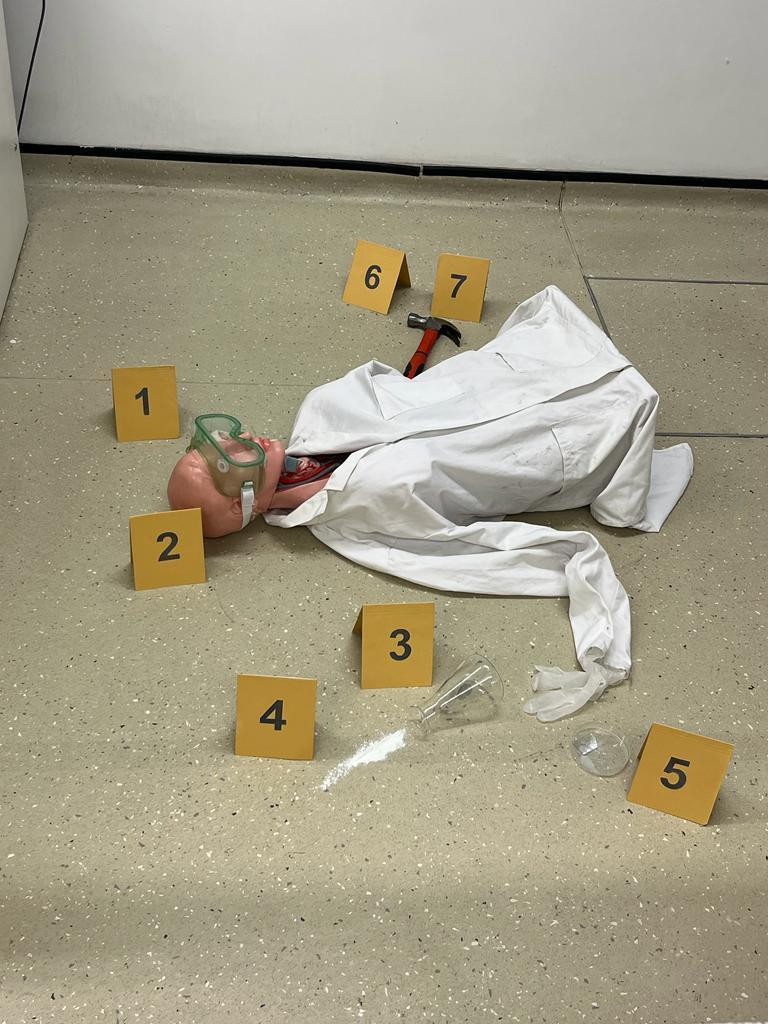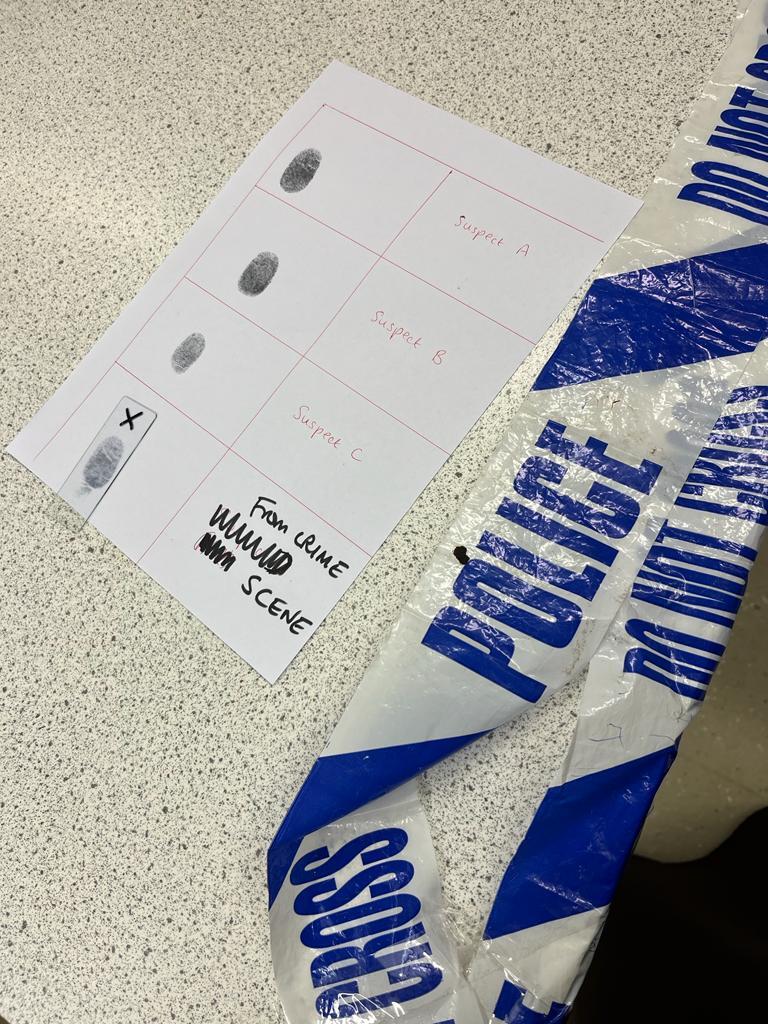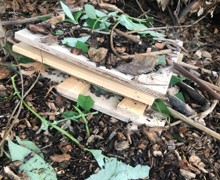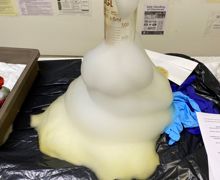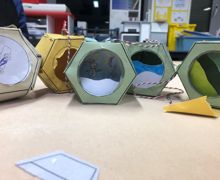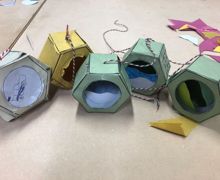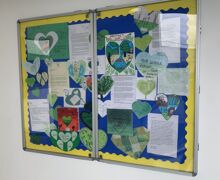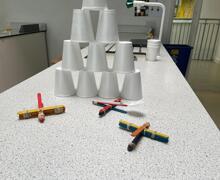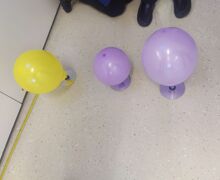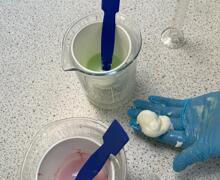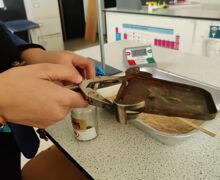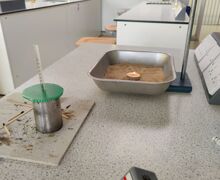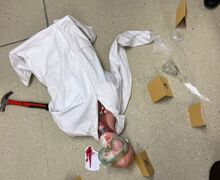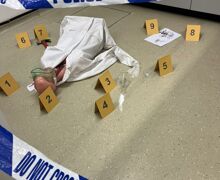- Home
- Secondary
- Subject Information
Science
BackIntroduction
Science is intrinsically fascinating and inspiring, and while the inquisitiveness of the young lends itself naturally to scientific study and endeavour, nobody ever really loses the desire to know more about the workings of the world around them. Whether you consider yourself a scientist or not, there is no doubting that science touches every part of your life from the alarm clock that wakes you up in the morning to the toothpaste you use before bed and, of course, the way you are able to read this right now.
Our Vision:
Students are provided with an engaging and stimulating learning environment, where they grow a love and curiosity for Science and use their scientific and practical skills to become tomorrow’s Scientists.
Our main aims are:
- To enable students to develop and build on their scientific knowledge and understanding across all key stages
- To instil curiosity and a love for Biology, Chemistry & Physics at KS3, KS4 & KS5
- To provide students with accessible and engaging lessons that encourage progress and increase attainment across all abilities
- To enable students to develop both their scientific and practical skills
- To encourage students to study STEM subjects in Higher Education and to prepare students for this
- To enable students to relate Science to their everyday life
We aim to ensure that students are given the experiences which will enable them to:
- Gain the necessary knowledge and understanding to become confident citizens in an ever increasingly technological world
- recognise both the usefulness and the limitations of scientific technique
- realise that Science is relevant to many aspects of everyday life
- continue their studies in a scientific field after they leave school, should they wish to do so
- Science teaching focuses on student centred learning which encourages the development of scientifically literate students equipped to succeed in the twenty first century.
KS3
At Loxford we pride ourselves in developing pupil’s skills of Science from their primary years.
The Science department are using the Activate SOW , which presents Science in an Innovative way, in order to engage pupils’ interest, and KS3 SOW is covered in Year 7, Year 8 and Year 9
Over the next three years pupils will build upon the experiences and skills they learnt at KS2 Science, and develop these to a higher level.
Pupils will be studying a variety of science based topics, during the curriculum, which are taken from the three main schools of Science – Biology, Chemistry, and Physics.
In addition to the knowledge of Science pupils will also be encouraged to develop their skills in specific areas of Science that they may not have come across yet, such as:
- Ethics- The moral codes a Scientist should be working with in order to reduce harm to Humanity, and the Natural World.
- How science works- To be able to understand how experiments are planned, variables to be used, and how to evaluate work.
- Ecology- To be able to understand the delicate balance of ecosystems and how they can be damaged by human activity.
- Conserving Energy- To know how humans in their eagerness to develop, they have altered the natural balance of the world. And what man is doing in order to prevent further damage.
Observational and practical skills will be built upon in order to make pupils more rounded Scientists, and get them ready for GCSE.
Once a year pupils across KS3 will be involved in National Science Week. During this week pupils will be taking part in fun and exciting new ways of looking at Science. For example; pupils in year 8 will have to work out who the murderer is in a Forensic Laboratory!
Students at KS3 follow the fusion programme of study, with elements of HSW (How Science Works) and practical investigative work embedded into the schemes of work from Year 7 to Year 9
Students are taught all three disciplines of Science and are continuously assessed to help aid their progress. Students are inducted in a 2 week programme emphasising the Health and Safety aspects of working in a lab and are set after taking their GOAL tests.
The emphasis of the programme is to prepare students for the rigour of KS4 as well as to develop a number of key skills.
Topics followed by students at KS3:
| Biology | Chemistry | Physics | |
| Year 7 |
|
|
|
| Year 8 |
|
|
|
| Year 9 |
|
|
|
KS4
We follow the AQA GCSE Combined Trilogy & AQA Separate which consists of Biology, Chemistry and Physics at GCSE level. Majority of our students study the combined GCSE Science Trilogy with exceptional students studying the Separate science which consists of Biology, Chemistry and Physics.
- Human Biology – Co-ordination and control, Healthy eating, Drug abuse, Controlling infectious diseases.
- Biology – Cells, How plants produce food, Energy flows, Enzymes, Homeostasis, Inheritance
- Evaluation and Environment – Adaption for survival, Variation, Evolution, How people affect the planet
- Energy and Energy Resources – Heat transfer, Using energy, Electrical energy, Generating electricity
- Physics – Motion, Speeding up and slowing down, Work energy and momentum, Static electricity, Current electricity, Mains electricity, Nuclear physics
- Radiation and the Universe – Electromagnetic waves, Radioactivity, The origins of the Universe
- Products from Rocks – Rocks and buildings, Rocks and metals, Crude oil.
- Chemistry – Structures and bonding, Structures and properties, Rates of reaction, Energy and reactions, Electrolysis, Acids alkalis and salts.
- Oils, Earth and Atmosphere – Products from oils, Plant oils, The changing world.
- Biology – Exchange of materials, Transporting substances around the body, Microbiology
- Chemistry – Development of the periodic table, More about acids and bases, Water, Further Chemistry
- Physics – Turning forces, Light and sound, Electromagnism, Stars and space.
Topics followed by students at KS4
| Biology | Chemistry | Physics | |
| Year 10 |
Adaptations, Interdependence & Competition Organisation of an Ecosystem Biodiversity Trophic Levels in Ecosystems Food Production |
Quantitative Chemistry Chemical Changes Energy changes Rate and Extent of Chemical Change Organic Chemistry Chemical Analysis Chemistry of the atmosphere Using Earth’s Resources |
Energy |
| Year 11 |
Homeostasis & The Nervous System Hormonal Coordination in Humans Reproduction Variation The Development of Understanding of Genetics and Evolution Classification of Living Organisms
Revision |
Organic Chemistry Chemical Analysis Chemistry of the Atmosphere Using Earth’s Resources
Revision |
Forces Observing & Recording Motion Waves Magnetism & Electromagnetism
Revision |
GCSE Results 2024
Congratulations to the Year 11 students on achieving:
74% grades 99-44 in Combined Science
100% grades 9-4 and 71% grades 9-7 in Separate Science: Biology
100% grades 9-4 and 76% grades 9-7 in Separate Science: Chemistry
100% grades 9-4 and 66% grades 9-7 in Separate Science: Physics
GCSE Results 2023
Congratulations to the Year 11 students on achieving
66% grades 99-44 in Combined Science
98% grades 9-4 in Biology
96% grades 9-4 in Chemistry
98% grades 9-4 in Physics
GCSE Results 2022
Congratulations to the Year 11 students on achieving:
- Combined Science - 60% 9-4
- Biology - 100% 9-4
- Chemistry - 100% 9-4
- Physics - 100% 9-4
Extracurricular activities
STEM Club
- Tuesday after school in S11.
At Loxford School, STEM club for KS3 is an engaging and educational extracurricular activity designed to cultivate students' interest and skills in these disciplines. The club offers a range of interactive and hands-on experiences to enhance students' understanding of STEM concepts, foster critical thinking, and promote teamwork.
Students have the opportunity to explore various areas of STEM through exciting experiments in line with the curriculum, allowing students to reinforce and expand their knowledge beyond regular classroom lessons.
One of the most popular projects this year in STEM club was investigating crime scenes over 6 weeks! Students collaborated to investigate different fingerprints, drug tests, blood tests and using chromatography to look at cheques. This promoted students to collect data, fostering their understanding of the scientific method and encouraging them to think critically about experimental procedures and results. Other exciting experiments this year involved making lava lamps, elephant toothpaste, bath bombs, parachute egg drops, pin hole cameras and many, many more.
STEM club is guided by knowledgeable teachers who provide support and guidance through the students' practical work. Participation in the STEM club in KS3 has provided numerous benefits to Loxford students. It helps them develop a passion for STEM subjects, enhances their problem-solving and analytical thinking abilities, fosters creativity, and promotes collaboration and teamwork. Furthermore, the club encourages students to explore potential future careers in STEM, providing them with a solid foundation for further studies and professional pursuits in these fields.
Future Careers for Science:
Through studying science students receive a broad knowledge of biology, chemistry and physics topics.
From learning about the human body, to chemical equations to energy processes science is a subject that is hugely varied.
Whilst studying science students develop mathematical, data handling, research, practical and communication skills.
There is a vast array of scientific careers that are available to science students with many people following a career in research, medical, education, technology or business job sectors.
As technology continues to change in the future there will always be a high demand for talented scientists.
Useful Links
KS3
Websites to help you in your studies in Science
- www.aqa.org.uk
- www.skoool.co.uk
- https://www.kerboodle.com/users/login
- https://www.bbc.co.uk/bitesize/levels/z4kw2hv
KS4
- Can access the Hodder VLE for online textbooks and activities to support their learning on the course.
- Can the access digital textbooks, homework sheets , animations, quizzes as well as revision tips and advice using Kerboodle too.
- https://www.kerboodle.com/users/login
- https://www.bbc.co.uk/bitesize/levels/z98jmp3
- https://www.skoool.co.uk/
- https://www.physicsandmathstutor.com/
British Science Week 2023
This year the Science department celebrated British Science Week 2023 (BSW).
Many exciting activities took place over the week.
Science teachers dressed up as Scientists and there was a poster competition for all students across all Key Stages on this year’s theme of ‘Connections.’
There was a BSW quiz for all Year 7-13 forms to complete during PSCHE.
Year 7 students had to present their ideas on Connections in Science. They also attended a webinar on Space with, BAME Scientist, Dr Maggie Aderin-Pocock.
Year 8 students took part in a lesson where they created their own Eco Farms, with a given budget.
Year 9 & Year 10 students had a bridge building lesson, where they worked in teams to ensure they met specific criteria & budget to ensure that the bridges they made were stable.
There was a special lunchtime session where students dissected animal hearts and there was a special afterschool STEM Club session on Forensics, where students had to investigate a crime scene.
We look forward to celebrating BSW next year!
